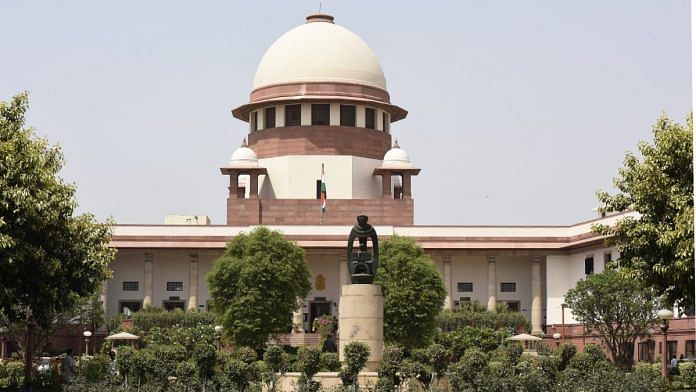A two-judge bench ruled that the ‘marriage of a Hindu female with a Muslim male’ is ‘neither valid nor void, but is merely an irregular (fasid) marriage’.
New Delhi: The Supreme Court Tuesday said the marriage of a Muslim man with a Hindu woman was an irregular (fasid) marriage, but that a child born out of such a marriage would be entitled to claim a share in the father’s property.
Pronouncing judgment in a case where Shamsudeen, the son of a Hindu woman Valliamma and a Muslim man Mohammed Ilias, was fighting for his share of the father’s property, the bench of Justices N.V. Ramana and Mohan M. Shantanagoudar ruled: “We conclude that the marriage of a Muslim man with an idolater or fireworshipper is neither a valid (sahih) nor a void (batil) marriage, but is merely an irregular (fasid) marriage. Any child born out of such wedlock (fasid marriage) is entitled to claim a share in his father’s property.”
The bench added: “It would not be out of place to emphasise at this juncture that since Hindus are idol worshippers, which includes worship of physical images/statues through offering of flowers, adornment, etc., it is clear that the marriage of a Hindu female with a Muslim male is not a regular or valid (sahih) marriage, but merely an irregular (fasid) marriage.”
It also referred to the Principles of Mahomedan Law to say that “irrespective of the word used, the legal effect of a fasid (irregular) marriage is that in case of consummation, though the wife is entitled to get dower (maintenance in case of spouse’s death), she is not entitled to inherit the property of the husband. But the child born in that marriage is legitimate just like in the case of a valid marriage, and is entitled to inherit the property of the father.”
Also read: Top court comes to the rescue of star-crossed Hindu-Muslim couple, defies parents
30 years of appeals
The SC order came on an appeal filed against a 2007 Kerala High Court judgment that had said Shamsudeen could not claim a share of the property. The high court judgment itself reversed a 1994 district court judgment awarding him a share, which in turn had overturned the original decision of an addition sub court at Thiruvananthapuram in 1989.
While Shamsudeen asserted that his parents’ marriage was legal and therefore he was entitled to a proper share of his late father’s property, there were counter-claims from other claimants who said his mother Valliamma was “not the legally wedded wife of Mohammed Ilias, and that she was a Hindu by religion at the time of marriage”.
They also claimed that she had “not converted to Islam at the time of her marriage”, and thus the plaintiff — Shamsudeen — was “not entitled to any share in the property of Mohammed Ilias”.
They also claimed that Mohammed Ilias “had died two years prior to the birth of the plaintiff”.




It is clear through SC that Islam can never reconcile with Hindism. It demands conversion for social integration through marriage. Voluntarily or forcibly. Do we such religion in Hindu India? Is it not an affront to the very idea of Hinduism?